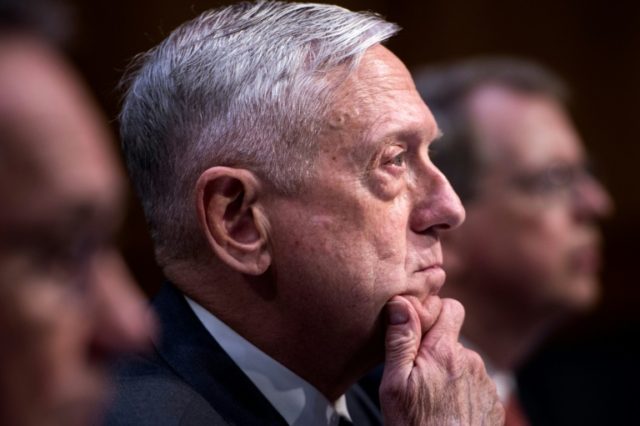WASHINGTON, DC — U.S. Secretary of Defense Jim Mattis on Wednesday expressed support for President Donald Trump’s decision to end America’s participation in the Iran nuclear deal, dismissing the pact as “inadequate.”
His comments came during a Senate Appropriations Committee hearing on Wednesday focused on the Pentagon’s 2019 budget.
Mattis told lawmakers that President Trump did not make his decision in haste, suggesting that the administration is working on an alternative effort to prevent Iran from obtaining nuclear weapon capabilities.
Secretary Mattis explained:
It wasn’t a hasty decision. The administration has been in place for over a year and for over a year we’ve attempted to work with allies to address the shortcomings on it. So, I think we now have the opportunity to move forward to address those shortcomings and make it more compelling. That effort is underway already.
The Pentagon chief assured the Senate panel that the Trump administration would continue working with U.S. allies to prevent Iran from obtaining an atomic bomb post-America’s withdrawal from the agreement.
Non-U.S. signatories to the agreement have suggested that they intend to remain committed to the deal even after Trump’s decision.
Referring to the president’s decision to pull out from the Joint Comprehensive Plan of Action (JCPOA), the pact’s official name, Mattis told Senators:
I believe what’s happened is the president could not affirm as required that this agreement was being lived up to and in the best interests in all aspects of what was supposed to be happening under the JCPOA…We have walked away from the JCPOA because we found it was inadequate for the long-term effort [against Iran]. This was something that was probably noted by the Senate several years ago when the Senate did not endorse it as a treaty. So we will work with our allies and try to bring Iran back into more responsible behavior.
President Trump long cautioned that absent a fix to the agreement’s flaws, his administration would not continue to implement it.
Mattis declared that Iran failed to reduce its “malicious activities” in and around the Middle East as a result of the agreement reached between Tehran and U.S.-backed world powers — the U.K., France, Germany, Russia, and China — in July 2015.
“We have not seen any drawdown or reduction in Iran’s malicious activities and malign activities across the region,” the Pentagon chief testified.
Mattis highlighted what he believes to be the top “five” threats that Iran poses to the United States and the international community: the nuclear issue; terrorism; ballistics missile efforts; ongoing cyber attacks; and threats to international commerce in the Red Sea and the Persian Gulf.
Mattis stressed that Tehran did not live up to its commitments under the deal, which was supposed restrict Iran’s nuclear operations in exchange for relieving the Islamic Republic of crippling economic sanctions, namely those the United States and the United Nations have imposed.
Israel asserts that U.S.-led world powers entered into the deal under a “false pretense.”
Citing “new and conclusive proof” of violations by Iran, Israeli Prime Minister Benjamin Netanyahu has accused Tehran of continuing to hide and enhance its nuclear weapons program after the agreement.
Iran insists that it is not seeking to build a nuclear weapon, repeatedly arguing that its atomic program is for peaceful civilian purposes.
On Tuesday, President Trump announced his administration would be reimposing sanctions lifted under the deal, a move that the White House described as “terminating the United States’ participation in the Joint Comprehensive Plan of Action (JCPOA),” the pact’s official name.
During the hearing, Dick Durbin, the No. 2 Democrat in the Senate, denounced President Trump’s decision to withdraw from the pact as “not only wrong but reckless.”
“By walking away from this agreement we are forsaking the opportunity to continue to monitor in detail the [nuclear] work done by Iran to make certain that they live up to its terms,” alleged Sen. Durbin, the Democratic whip.
He argued that Trump’s move will negatively impact America’s credibility and overall standing in the world.
In his written testimony, Mattis warned, “Iran continues to project malign influence and threaten freedom of navigation in the Middle East. They are also modernizing their space, cyber, missile, and conventional maritime capabilities, which pose a direct threat to our Allies and our interests in the region.”
Wednesday’s hearing was focused on the Pentagon’s $686 billion budget for 2019, which Durbin described as the “largest budget of any department ever in the history of the United States of America,” urging Mattis to be responsible with taxpayer funds.

COMMENTS
Please let us know if you're having issues with commenting.